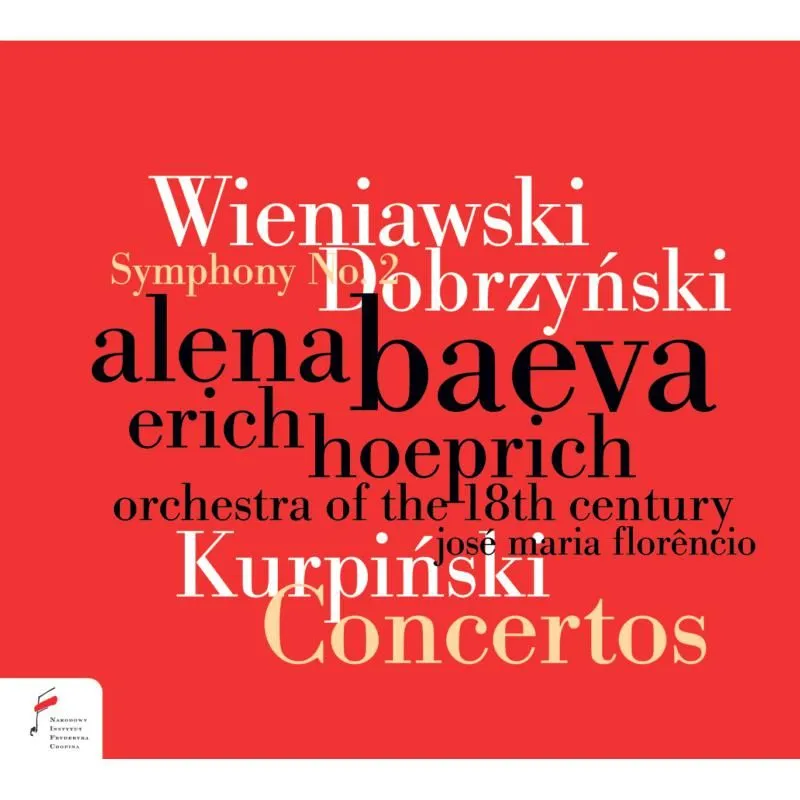
Dobrzyńsky • Kurpiński • Wieniawski Dobrzyńsky: Overture de Concert, Op. 1; Symphony No. 2 in C minor; Kurpiński: Clarinet Concerto**; Wieniawski: Violin Concerto No. 2 in D minor* *Alena Baeva (violin), **Erich Hoeprich (clarinet); Orchestra of the 18th Century/José Maria Florêncio NIFC NIFCCD078 74:34 mins
As the first recording on period instruments of a Henryk Wieniawski violin concerto, this release would be self-recommending. But the sheer musical brilliance of Alena Baeva’s collaboration with the Orchestra of the 18th Century under the baton of José Maria Florêncio makes their performance of the Violin Concerto No. 2 in D minor essential listening. No one ought to take the Lublin-born composer for granted, yet the traditional status of his two concertos as cornerstones of the repertoire sometimes leads to exactly that. Here the music is freshly reconsidered: in comparison with famously sweet-toned interpretations from Michael Rabin to Gil Shaham, Baeva’s softer-grained playing is more blended with the orchestral soundscape, though she has all the fire and finesse required in such a virtuosic showpiece.
Despite the impressive line-up of names associated with its premiere – it was first performed by Wieniawski himself in St Petersburg in 1862 under the baton of Anton Rubinstein, and dedicated to Pablo Sarasate – the concerto is about much more than sheer virtuosity. Wieniawski’s music is full of poetry, and Baeva is attuned to all its aspects; good news, then, that this will be followed by a companion recording of her playing Wieniawski’s earlier, F sharp minor concerto.
This recording presents three generations of Polish composers, putting Wieniawski – who belonged to the generation after Chopin – in the context of Chopin’s contemporary Ignacy Feliks Dobrzyński and the earlier Karol Kurpiński. The only surviving movement of Kurpiński’s Clarinet Concerto reveals much of this important figure’s musical personality. Premiered in Dresden in 1823, the Clarinet Concerto may well reflect his friendship with Weber; following convention it consisted of three movements, and Erich Hoeprich’s warm performance of the opening Allegro makes the disappearance of the full work a matter of regret.
Unlike the exiled Chopin, Dobrzyński was to remain in Poland, but his music reflects his links to wider musical culture. There is a Rossini-esque feeling to Dobrzyński’s Concert Overture, a remarkable Op. 1 that makes very agreeable listening. Beethovenian drama is heard in Dobrzyński’s Second Symphony, especially in the opening of the lengthy first movement, but as shown by the revelatory performance that Florêncio draws from this period orchestra, there is much more to it, and as a patriotic statement it could be said to have paved the way for Smetana’s Má vlast. Subtitled ‘Caractèrisque’, the symphony (1831) is a musically pioneering national statement whose movements are based on Polish national dances; in the audacity of its closing pages, it also seemingly anticipates Berlioz and Liszt. The third and fourth movements (Minuetto alla Mawwzovienna and Finale all Cracovienna) are exhilarating in their momentum, and played with transparent lightness. But beware of listening while driving: this is the double-the-speed-limit music.
John Allison
More reviews
Refined performances of Bartók’s final orchestral scores
Lully’s kaleidoscopic masterpiece brought to life
An inspired debut disc from the Fieri Consort
Expertly-crafted works by overshadowed female composers
The extremes of virtuosity explored in Barenboim’s second disc